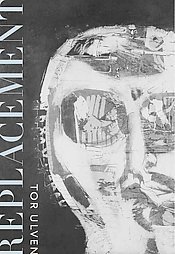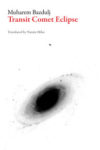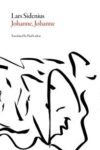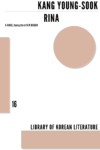Published two years before Tor Ulven’s suicide, Replacement has been billed as the Norwegian author’s only “novel.” But this word doesn’t fully define a book without familiar narrative features; one which immerses us in a storyless world. Replacement is about the banal, not the novelistic. It’s a work in which, as one character says, “nothing stands out any more than anything else.” Nothing is artificially emphasized; all is equally weighted, whether people or things, or even the most microscopic physical processes. The end result is less like reading a novel than listening in on the background noise of the universe.
The book begins with a description of a draft of air parting a pair of curtains. Light is let in through a slit, then shut out, leaving darkness. Then light, then darkness, again and again. Before anyone appears on the scene, there is only an anonymous motion — a breath that lies behind light and dark, life and death, such that each of these states is purely “provisional.” This tableau sets the tone of the text as a whole. What follows is a flow of words in which characters come into being only to collapse, their voices rising and falling before being replaced. Pronouns slip from “he” to “you” to “she” to a second, italicized “she,” ceaselessly switching perspective. But beneath this broken string of personae lies a single life-giving movement, like the breeze that blows open those curtains.
In Replacement, the personal is preceded by the elemental; everyone is embedded in their environment. A character contemplates flashes of lightning, and then looks at X-rays of his body. “You could examine the X-rays in the glow of the lightning,” he considers. “Perhaps the electricity could make the skeleton come alive.” After all, the energy we see in the sky is the same stuff that streams through our nervous systems. In this sense, subject and object can’t stand apart — what we observe is what animates us; our world is what we are made of. Later, a pair of “faded bicycle tracks” are likened to “the twisted rope-ladder shape of a DNA molecule.” Here a metaphorical leap is made by the mind’s eye, yet we’re reminded that this mind is made from the same “molecules” it imagines. Consciousness may impose meaning on nature, but nature must first create consciousness. Thus, beneath these fragmentary thoughts and feelings, we glimpse what one character calls the “genetic truth” of our origins — the way we’re all formed from the same raw materials.
But while Replacement reveals our natural roots, it never leaves nature naively idealized. Indeed, nature always withdraws from ideals. Whenever a character comes across natural beauty, like when one sees shapes on the face of the moon, we’re bluntly reminded that such patterns possess “no real shape at all.” So, although Replacement reflects an aesthetic awareness of the world — an intense attention to the way life looks and feels — nothing is ever painted over or prettified. In this respect Replacement is far from “romantic,” far from some serenely pastoral appreciation of nature. In fact its tone is at times unpredictably critical, not merely meditative; more active than poetically passive. For instance, some of the book’s most astonishing moments come when a contemplative voice acquires an angry or agitated edge. One rant against bankers rivals Thomas Bernhard, ruthlessly berating “those dour, obsessive-compulsive, humourless pricks.” In Replacement, perception refuses to stop at beauty, being equally alive to bracing ugliness. To truly witness the world involves friction; sometimes we’re left feeling inflamed.
It’s often unclear whether Ulven’s voices are meant to be many, or one. They certainly speak and think of similar things. Like Beckett’s creations, all are crippled, decrepit, or otherwise waning. Decay, says one, is the “lowest multiple,” which may be why these characters seem to converge. In their infirmity, each shares something essentially human. As it’s put at one point, “people are only really revealed in decline.” Yet if decay and decline disclose the human condition, they also herald a kind of heroism. Early on, we meet an old man for whom “unbuttoning a shirt is a real task . . . a project in itself . . . a triumph every time.” Replacement is full of such everyday struggles. But because the book balances all events equally, compressing life’s major and minor moments, these delicate acts acquire a heartrending resonance.
Other epiphanies come when characters blur and melt into each other, into their surroundings, or both. Such scenes seem suffused with what Freud would call an “oceanic” emotional oneness. Two lovers trace the shadows of their hands along a wall, until the silhouettes “meet in secret . . . as if some unrecognized part of you had met some unrecognized part of her . . . in a place neither of you knew about.” Later on, Replacement’s most lyrical section sees another couple (they could be the same) strolling through a field. They pause, he holds her foot, and she empties a pebble from her shoe:
“Through your hand you could feel the warmth of her foot, and you watched the sunlight on the waving grass, and suddenly you felt as if you were a live wire, a relay . . . you were the connection between the reserve of beauty in her and the straightforward, endlessly complex reality around you, beginning with the sunlit grass and ending everywhere and nowhere. Did the landscape’s late summer light come from her or did her warmth come from the sun? Both.”
Yet once the revelation is over, Replacement returns us to the rough ground underfoot, to reality as it is before we’re aware of it. Summer fields are soon replaced by fossilized skeletons, by driftwood, detritus, and all of life’s “deafening biological racket.” This too, Ulven tells us, is truth. The true world, a dying voice claims as the book closes, is one where “if we’d never been born it’d make no difference.” Like life itself, Replacement is full of both beauty and suffering. Finally though, it feels full of something far beyond both. It’s filled with as much of the blind will of the world as any book can capture. But what we learn from it is that we’re bound to the world, and that the world is what binds us together.
This post may contain affiliate links.








